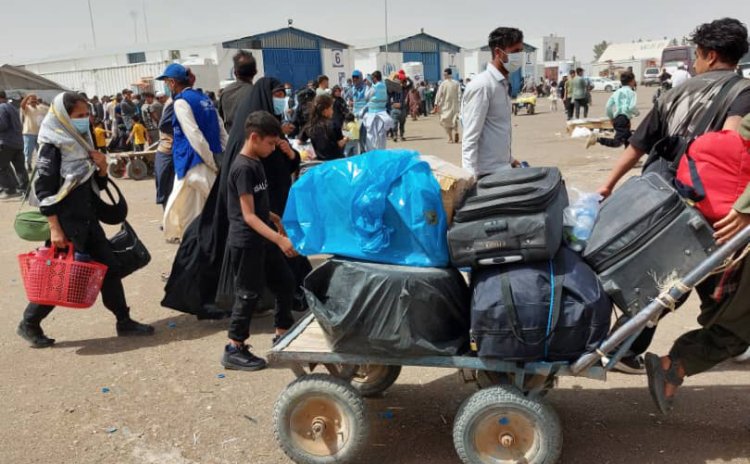"Border of Displacement": A Tale of Returning Refugees

Wearing the white cloak I had carefully ironed at home, I sit on the dust-covered grass beside a woman to whom my colleagues have administered an IV. She is about the same age as my grandmother—a weary traveler from the sun-scorched roads of two lands. She carries signs of Persian soil: a black chador, a Persian accent, and that gaze… a sorrowful look, heavy with grief, sometimes brimming, sometimes drying behind a halo of tears. Her eyes are a mirror reflecting the pain of a wounded nation.
And her sob... it’s an ancient grief, echoing from the narrow, twisted alleys of Afghan lives to the barren deserts of loneliness and exile. My homeland’s suffering mother cannot hold it in; she unfolds the heavy cloth of her sorrow and speaks of the hardships she has endured—tales that tighten your chest with sorrow.
And her son… that tall young man with raven-black hair now faded to a sickly yellow. His entire body trembles with violent, involuntary spasms—likely the result of beatings, the worst of them landing on his cerebellum. A twenty-year-old youth, once full of promise—how deeply will these unrelenting tremors cast a shadow over his future?
Where were the kind-hearted souls when the humiliation of foreign fists left bruises on his body? His mother places her hand on my knee, lowering her voice to a near-whisper, as if sharing something too shameful for others to hear. She points to her daughter—the pale-faced girl with almond-shaped eyes, eyes now drowned in tears.
“They beat my son,” she says. “His sister couldn’t bear to watch. She tried to stop them, and they beat her too. Even my daughter…” Her hand brushes the green grass as she continues, “Their leader came. His clothes were this very green, just like the grass. He turned to the policeman and asked, ‘You beat the boy—but why the girl? Why raise your hand against the woman?’”
She searches my eyes as if speaking straight from the depths of her wounded soul:
“There is no humanity left, my daughter... there is no Islam left in anyone.”
And I… I search the empty corners of my vocabulary, but find no words to ease her pain. I have nothing—emptier than empty. I can only sob for this family’s suffering.
We are all victims of this cruel fate. And yet the soil—one’s homeland—is the only place that offers unconditional refuge for the body and soul. I speak to her of home, of a land that will never turn us away; of doctors who, upon learning her son is a returnee migrant, would never neglect him.
In that park, a temporary shelter for refugees, there were hundreds of lives. Hundreds of unwritten stories—each one full of pain, of a sorrowful journey.
Generation after generation, Afghanistan has been caught in the grip of change—not the kind that grows from its soil, but one rooted in cruel fate. Thirty-four provinces grow or shrink on the map, but their wounds remain equally vast.
Stories from our homeland—the more tragic they are, the more readers they find.
Our springs are heavier than autumn.
The first day of year is colder than any winter’s start.
And fate’s spinning wheel, unwilling to turn in our favor, keeps circling our eyes with tears—a circle that stings all, regardless of gender.
Grief has built its home in our throats.
A child born at the border still has no home.
By Bahar Karimi
